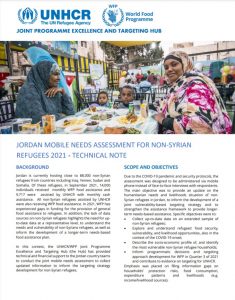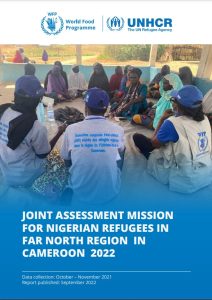Latest news
Joint Assessment Mission for Nigerian Refugees in Far North Region in Cameroon
With support from the UNHCR-WFP Joint Programme Excellence and Targeting Hub, UNHCR and WFP undertook a joint assessment mission for Nigerian refugees in the Far North region in Cameroon. The assessment aimed to inform the understanding of household vulnerability and future programme design.
The assessment found that almost half of Nigerian refugee households in Minawao settlement and in the host community of the Far North are highly vulnerable. The assessment also found that while access to basic services is more favourable in Minawao settlement than in the areas in its vicinity, households residing in the host community have relatively better livelihood opportunities. Against the background of high vulnerability levels, more than half of refugee households resort to negative coping strategies to meet essential needs and the economic capacity to meet essential needs using available resources at household level is greatly limited.
The survey was designed to generate statistically representative findings for both the refugee population residing in Minawao settlement and the refugee population living among the local host population in the settlement´s vicinity. Primary data was collected through a structured household questionnaire, key informant interviews and focus group discussions.
The full report is available here.
Sign up to the next cohort: Training Course on Applying the UNHCR-WFP Joint Targeting Guidance

Sign up now to the second cohort of the training course on Applying the UNHCR-WFP Joint Targeting Guidelines, facilitated by the UNHCR-WFP Joint Programme Excellence and Targeting Hub.
This course runs from September to October 2022 and is available to UNHCR and WFP staff via the links below:
The training is divided into two parts. Colleagues must first undertake a basic course on the Fundamentals of UNHCR-WFP Joint Targeting via Learn&Connect or WeLearn. Upon completion, you can then sign up for the cohort based course on Applying the UNHCR-WFP Joint Targeting Guidance: A series of 2.5 hour online workshops, run on a weekly basis over eight weeks, and conducted virtually using Microsoft Teams.
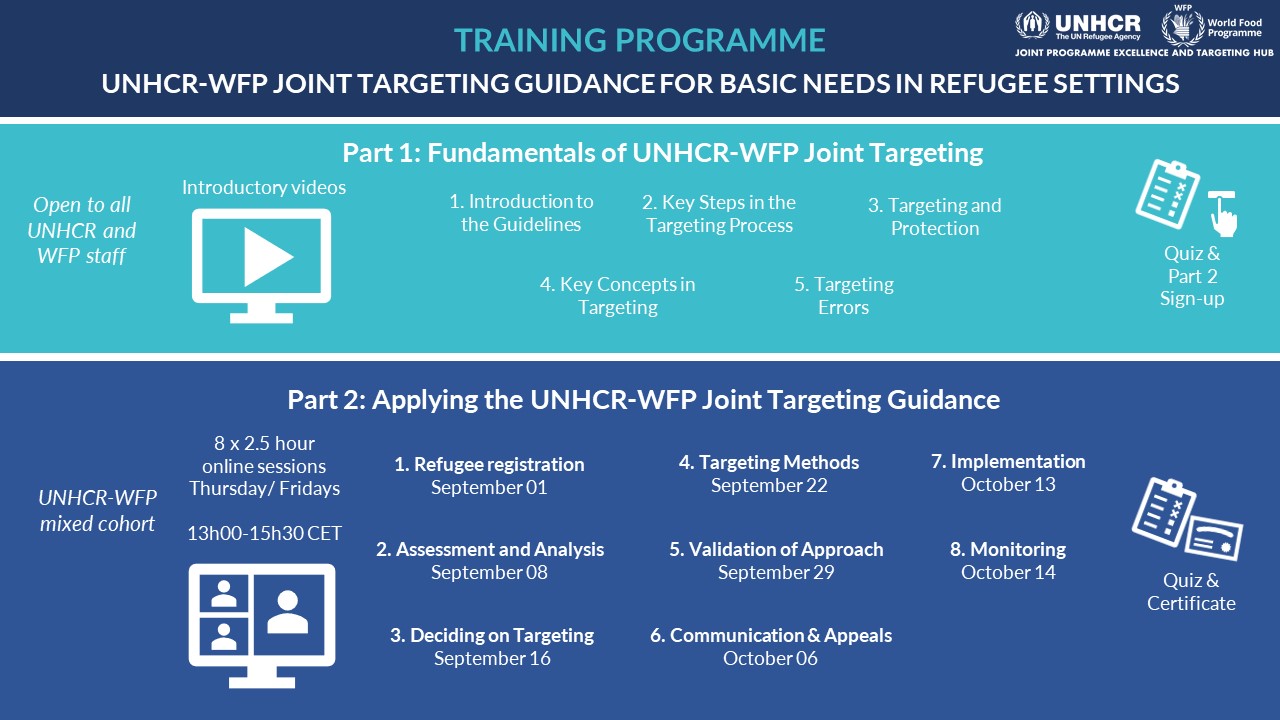
You can read the training participant feedback report for the first cohort to find out more about the course. This course is fact sheet recordable and provides a certificate.
In case of oversubsciption, applicants for the course on Applying the UNHCR-WFP Joint Targeting Guidance involved in programmatic activities related to targeting in refugee settings will be prioritized.
To get in touch with the UNHCR-WFP Joint Programme Excellence and Targeting Hub team, you can email us at [email protected].
Integrating Protection and AAP in Assessments and Monitoring
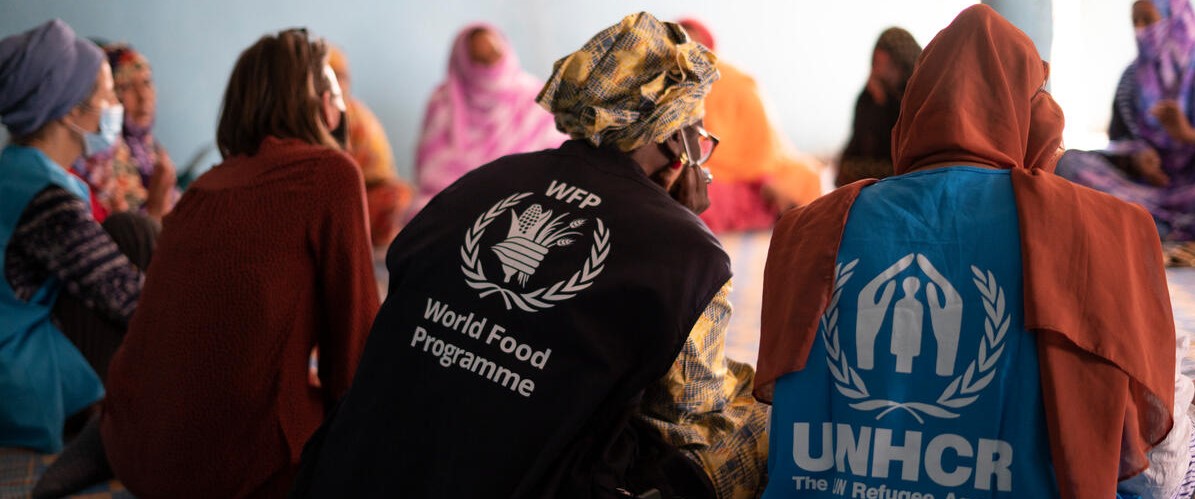
The UNHCR-WFP Joint Programme Excellence and Targeting Hub have developed a new technical resource on integrating protection and accountability to affected people in assessments and monitoring exercises.
This technical brief provides a selection of suggested core and supplementary questions concerning protection and accountability to affected people (AAP) that can be included in household surveys, focus group discussions, and key informant interviews that are carried out as part of UNHCR and WFP joint assessments or monitoring.
The questions presented in this brief have been adapted from UNHCR and WFP surveys and questionnaires in country operations supported by the Joint Hub as well as other available tools.
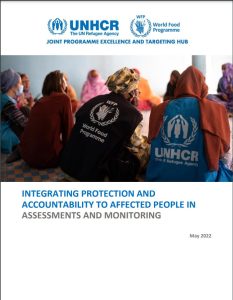
Designing and Implementing Joint Feedback Mechanisms

The UNHCR-WFP Joint Programme Excellence and Targeting Hub have developed a new technical resource on Designing and Implementing Joint Feedback Mechanisms.
The document provides a guide for WFP and UNHCR country operations on how to maximise accountability, effectiveness and efficiencies through the design and implementation of joint feedback mechanisms. The guide can also be used to navigate the participation of other UN or NGO partners in any closely coordinated or joint feedback mechanisms.
These documents provide UNHCR and WFP country offices with a set of four different options for joining feedback and complaints mechanisms, from closely coordinated to fully merged, with practical tips on how to implement these.
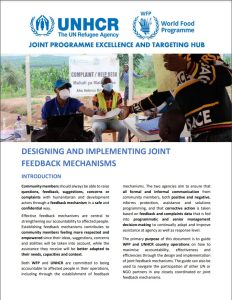
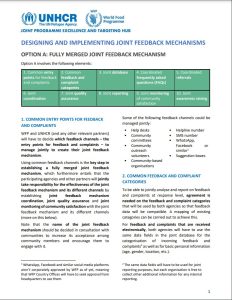
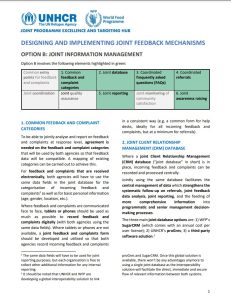
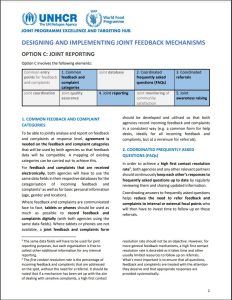
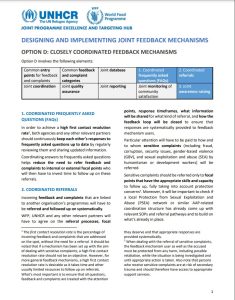
Alongside the obvious efficiencies in combining feedback mechanisms, joint feedback mechanisms make it easier for people of concern to share feedback and complaints, thereby improving their experiences of communicating with humanitarian and development actors.
By joining feedback mechanisms, a comprehensive overview of feedback and complaints shared by community members, and the follow-up required by relevant actors can be captured through centralised data and referral management. This centralised data and referral management helps to facilitate joint analysis on feedback data (including on key trends), to inform programmatic and strategic decision making so assistance is continuously adapted and improved.
How the UNHCR-WFP Joint Hub is promoting and supporting collaboration in Mauritania
An Interview with Ziad Ayoubi and Paulo Oliveira
Since 2020, UNHCR and WFP have been supported by the UNHCR-WFP Joint Programme Excellence and Targeting Hub in Mauritania, working with the local government to improve refugee self-reliance and resilience by including refugees in national social protection programmes, improving livelihoods, and ensuring access to basic needs and services.
In this Q&A, Ziad Ayoubi, the UNHCR Deputy Representative, and Paulo Oliveira, the WFP Deputy Country Director talk about the support provided by the Joint Hub in Mauritania and reflect on the progress so far.
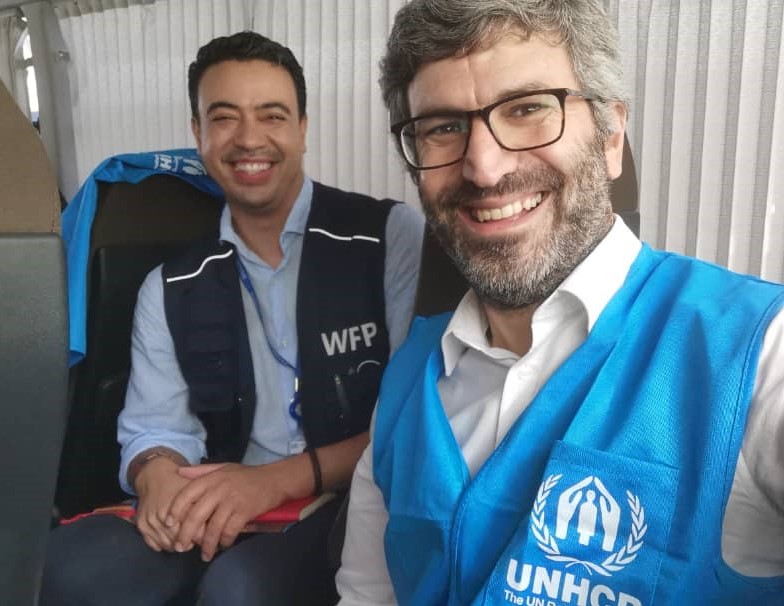
Paulo Oliveira, WFP Deputy Country Director, and Ziad Ayoubi, UNHCR Deputy Representative in Mauritania twitter.com/ziadayoubi. © UNHCR/ Ziad Ayoubi
1. How did you benefit from the support provided by the Hub?
Ziad: Both our operation in Mauritania and WFP requested support from the Hub for the design and implementation of a joint targeting strategy – which ensures that basic-needs assistance is provided to those most in-need – according to socio-economic aspects to identify the most vulnerable refugees. Together, we leveraged this technical support to connect with the government of Mauritania and the World Bank, aiming to include refugees in national social protection programmes.
Paulo: The Hub provided support on a range of technical aspects – all essential for the development of the targeting strategy – including how we share, use, and analyse data; how we manage risks; and how we involve the community in decision making. Since these exercises are not done very often, as it is difficult to keep technical resources for targeting in-country, having this capability to fill technical gaps was very important.
2. What was the main value the Hub brought to our Mauritania operation?
Paulo: One of the main added values was the neutral role the Hub played. Because of different mandates and approaches, sometimes it can be difficult to reach a consensus – having an interlocutor who represents a joint interest is important. The constant follow-up from the Hub also helped us to keep things moving forward – sticking to timelines in a very technically complex process – ensuring we met the needs of the people we serve in a timely manner, and having two-way discussions through broad consultations.
Ziad: What also worked very well was the good collaboration between WFP and UNHCR, in addition to having an in-country consultant designated by the Hub to assist in the process. The work that was done with support from the Hub was incredibly different from the work that was done before; the Hub prepared the ground for decision making, always providing options – we were then able to make informed decisions because of all the background insight and knowledge.
3. What have you achieved so far through the Hub’s support?
Ziad: We were able to achieve our common objectives to improve refugee self-reliance and resilience – the people we serve continued to be the priority in our collaboration. The technical support provided by the Hub allowed us to have a fair targeting and to identify those who are most vulnerable based on socio-economic aspects. This included secure data sharing processes – following our data protection principles – to determine eligible households; an assessment conducted with refugees to better understand their needs; and the development of a joint targeting strategy to identify those most vulnerable.
Paulo: Thanks to the Hub’s support, we had a very technically sound process based on common agreements – we were able to expand and be quicker in our response, bringing great improvement to the lives of refugees. For example, we are supporting over 1,000 income-generating activities, as well as ensuring the conservation of environmental, soil and water assets through livelihood interventions (relief-based interventions that involve providing food and meeting other essential needs), seeking to reduce the pressure on natural resources.
4. What is your advice to an operation seeking support from the Hub?
Paulo: Be very clear on what your expectations are – it is very tempting to have a 10-page Terms of Reference (ToR) for the Hub with everything that you want. But prioritizing and being pragmatic is very important to create a clear ToR that will be useful in guiding the entire process.
Ziad: Have initial discussions on each step at the beginning of the process, getting full clarity on different roles and responsibilities to ensure all those involved know how and when to engage.
——————
More information on UNHCR and WFP’s work in collaboration with the Government of Mauritania to support the inclusion of refugees in the national social safety net can be found here.
Community consultations to inform targeting and prioritization
Building on the UNHCR-WFP Joint Guidance on Targeting, the UNHCR-WFP Joint Programme Excellence and Targeting Hub have developed a new technical resource on conducting community consultations to inform targeting and prioritization exercises.
The document highlights key considerations and learning from the Joint Hub’s experience of supporting community consultation exercises in Cameroon, Mauritania, Rwanda, and Uganda and focuses on the use of community consultations during the validation stage of the targeting or prioritization process.
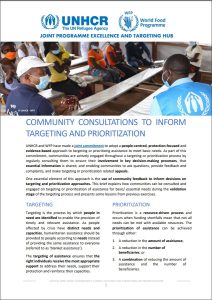
New Training Programme on the UNHCR-WFP Joint Targeting Guidance
UNHCR and WFP have launched a Joint Training Programme on the UNHCR-WFP Joint Guidance for Targeting of Assistance to Meet Basic Needs in refugee settings, facilitated by the UNHCR-WFP Joint Programme Excellence and Targeting Hub. It is available to all staff in UNHCR and WFP from the links below.
The training is divided into two parts as per below. For colleagues wishing to understand only the basics around targeting, the completion of the Fundamentals of UNHCR-WFP Joint Targeting alone is sufficient. For colleagues wishing to be able to actively engage in the targeting process, the course Applying the UNHCR-WFP Joint Targeting Guidance provides a comprehensive overview.

Upon completion of the Fundamentals of UNHCR-WFP Joint Targeting, colleagues can sign up for the second course Applying the UNHCR-WFP Joint Targeting Guidance: A series of two-hour online workshops, run on a weekly basis for eight weeks, and conducted virtually using Microsoft Teams. For the first cohort a maximum of 75 participants will be accepted.
75 participants are currently enrolled in the first cohort that runs from 15th March to 12th May. The course will be run again from August to October 2022. Colleagues wishing to sign up for the next cohorts are requested to complete the Fundamentals of UNHCR-WFP Joint Targeting and register for the course Applying the UNHCR-WFP Joint Targeting Guidance via WeLearn or Learn & Connect.
Applicants for the course Applying the UNHCR-WFP Joint Targeting Guidance involved in programmatic activities related to targeting in refugee settings will be prioritized.
This course is fact sheet recordable and provides a certificate.
To get in touch with the UNHCR-WFP Joint Programme Excellence and Targeting Hub team, you can email us at [email protected].
Cadres globaux HCR-PAM traduits en français
Le UNHCR-WFP Joint Programme Excellence and Targeting Hub a soutenu la traduction en français des principaux cadres mondiaux du HCR et du PAM sur le orientations conjointes pour le ciblage de l’assistance afin de répondre aux besoins essentiels, le stratégie conjointe pour améliorer l’autosuffisance en matière de sécurité alimentaire et de nutrition dans les situations de réfugiés prolongées, et le partage de données. Vous pouvez accéder à ces documents ci-dessous.
—————–
The UNHCR-WFP Joint Programme Excellence and Targeting Hub supported the translation of key UNHCR-WFP global frameworks on joint targeting, self-reliance, and data sharing into French. You can access these documents below.
Data Sharing Addendum
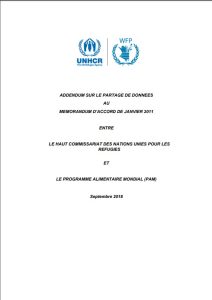
Joint Self-Reliance Strategy
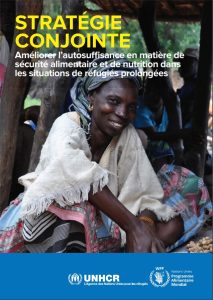
Joint Targeting Guidance
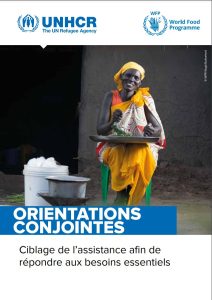
Joint Targeting Principles
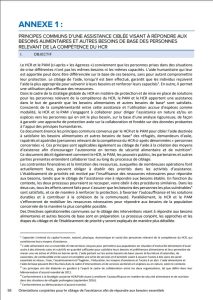
UNHCR-WFP Joint Assessment of Burundian Refugees in South Kivu, DRC
With support from the UNHCR-WFP Joint Programme Excellence and Targeting Hub, UNHCR and WFP undertook a joint needs assessment for Burundian refugees in Lusenda and Mulongwe camps in South Kivu, DRC.
The assessment aimed to inform the understanding of household vulnerability and to any potential joint targeting strategy and future programme design. The assessment employed a full census of every household in the two camps, with an additional sample-based household survey that focused on supplementary themes in more depth.
The assessment found that 94% of households to be highly vulnerable. Based on the findings, it was recommended to continue with food and non-food assistance to the entire Burundian refugee populations in Lusenda and Mulongwe camps, while also exploring opportunities to reinforce refugee resilience and self-reliance, including facilitating access to land. The full report (in French) is available here.
DRC: Joint Assessment of Burundian Refugees
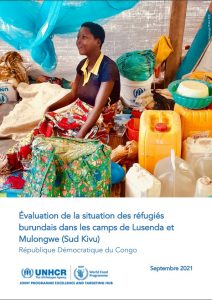
UNHCR-WFP Joint Assessment of Non-Syrian Refugees in Jordan
Carried out more than one year into the COVID-19 pandemic in Jordan, the UNHCR-WFP joint mobile Essential Needs Assessment (mENA) for non-Syrian refugee population in Jordan fills a vital information gap for this population group, providing essential and timely multi-sectorial vulnerability data including on food security, negative coping strategies, monetary poverty, livelihoods, shelter and safety. The assessment is a key milestone in UNHCR and WFP’s efforts to develop a joint approach for the targeting of vulnerable non-Syrians for basic needs and food assistance.
You can read a Technical Brief outlining the assessment approach and lessons learned, in addition to the WFP Dashboard that provides a summary of the primary findings.
Technical Brief on Jordan Mobile Needs Assessment
